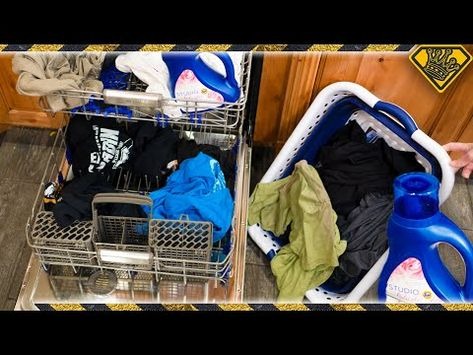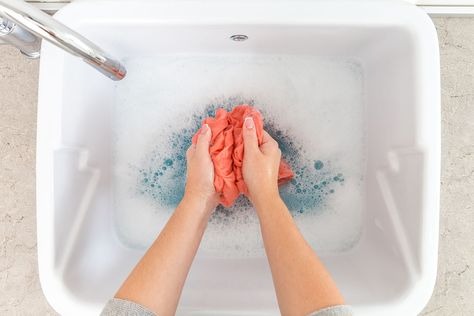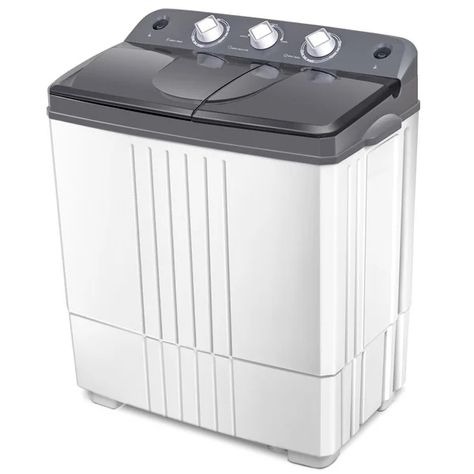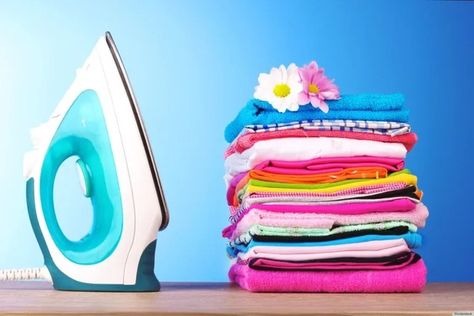
Your washing machine broke down? Or you ran out of laundry detergent, or maybe you’re just feeling a bit adventurous today? Or you’re just curious to know if you can wash clothes in a dishwasher?
Well, people do a lot of wild things when it comes to laundry, but washing clothes in a dishwasher is definitely one of the wildest. Unfortunately, though it may sound appealing, washing clothes in a dishwasher isn’t recommended. And there are plenty of good reasons why.
This article will explore why it’s not recommended to wash clothes in a dishwasher, what risks it can come with, and alternative ways to clean your clothes if you don’t have a washing machine. So, let’s dive in!
Table of Contents
Can You Wash Clothes in a Dishwasher? And Why Not?
The straight answer is no! You shouldn’t even try washing clothes in a dishwasher. Dishwashers are not made to wash clothes and are equipped with features entirely different from a washing machines.
Every dishwasher manufacturer clearly states in their user manual that clothes should not be washed in their machine. And there are valid reasons behind it.

Dishwashers Work At Very High Temperatures:
Washing machines have adjustable settings that allow you to choose the right water temperature for different fabric types (like delicate materials). On the other hand, dishwashers aren’t designed for laundry and usually only offer one setting: HOT. While some dishwashers do offer regular cycles, most of them don’t.
The average dishwasher setting is 140-150F (60-65C); washing machines typically run on 110F (43C). This extreme heat is strong enough to warp or even melt regular plastic objects like Tupperware; hence there are dishwasher-safe versions of plastic containers.
So, you can imagine what it would do to your clothes—fabrics with synthetic fibers are especially at risk, as nylon and polyester can melt and shrink in such extreme temperatures.
Dishwasher Soap Is Too Strong:
The dishwasher soap is designed for cutting through thick grease on dishes and cookware. The usual ingredients in dishwasher soap include chlorine bleach, phosphates, sodium, and surfactants, which are all pretty strong.
Combine these harsh concentrated chemicals with high temperatures, and your clothes can look like a patchwork of different colors and sizes; or, worse, disintegrate entirely! And even if you manage to save your clothes, you’d still need a lot of fabric softener and detergent to get rid of the soapy residue and weird smell. Or be ready for skin irritation and rashes.
Clothes Won’t Get Cleaned Properly:
Dishwashers are designed to spray the water to clean off the residue, which is great for dishes but not so much for clothes that need agitation and scrubbing to get a proper cleaning. So even if your clothes get soaked in detergent, it’s unlikely they will get cleaned properly.
Instead, there is a high chance that your clothes will pick up more stains from the grease, oil, and grime from the dishwasher.
And that’s not it; there are many more reasons to avoid washing clothes in a dishwasher, like the fact that dishwashers aren’t equipped to dry clothes the way a washing machine does, or they can’t accommodate large items of clothes or the filter can get clogged with lint from the clothes. So, it’s best to avoid washing clothing in a dishwasher entirely.
Potential Risks of Washing Clothes in a Dishwasher
It might be tempting for some people to throw their clothes in the dishwasher when they don’t have access to a washing machine, but remember, several risks come with it. Here we have listed a few for you:
1- It’s A Safety Hazard:
Dishwashers are designed to wash solid, heat-resistant, dishwasher-safe items—these items don’t warp, melt, or get damaged in the dishwasher. Clothes, on the other hand, are none of these things and aren’t suitable for the environment of a dishwasher.
This means the clothes can catch fire, melt if they contain plastic, clog the drain, and get stuck in the sprayers, and all of these situations can lead to serious safety repercussions like shock, fire, or the machine breaking down.
2- You’ll Ruin Your Clothes:
The heat, detergent, and long cycles of a dishwasher are too harsh for clothing. If you’re lucky, the clothes won’t warp or melt, but they’ll definitely come out looking worse than when you put them in. The clothes can lose color and shape, become stiff and rough, shrink, or even get torn apart.
And if you’re planning to use regular laundry detergent in a dishwasher, it won’t work either. The laundry detergent has way more surfactant and enzyme and makes so much foam that the dishwasher can’t handle it. As a result, you’ll end up with overflowing bubbles, and your clothes still won’t be clean.
3- It May Damage Your Dishwasher:
Using the wrong items in a dishwasher can damage the machine itself. Things like socks or underwear are liable to clog the drain and the sprays, bigger items can get stuck in the spinning, and delicate clothes can warp or melt and stick to the surface of a dishwasher.
During the drying cycle, the clothes can also trap heat and cause damage to the motor or other components of the dishwasher. And all of these will lead to temporary or permanent damage to the dishwasher components and eventually costly repairs or replacements.
4- It’s Not Eco-Friendly:
Washing clothes in a dishwasher is not only bad for your machine but is also inefficient and bad for the environment. The amount of energy and water needed to get a load of laundry done in a dishwasher is much higher than that required for a washing machine.
A washer can do its work in just 10 minutes, while a dryer requires half that time. But a dishwasher would take over an hour to complete one cleaning cycle. That’s a lot of energy and water going down the drain without achieving the same results as a washer-dryer. So—not eco-friendly at all.
5- It’ll Void Your Warranty:
Every dishwasher manufacturer explicitly states that you’re not supposed to wash anything other than dishes in your machine. So if you choose to ignore that and use your dishwasher for cleaning clothes, you’ll be voiding your warranty.
So if something goes wrong, the company won’t be liable to help out with a replacement or cover the costs of repairs.
And believe us, the list of risks doesn’t end here. There are many more reasons, like permanent odors, the inability to sanitize, or the risk of leaving behind residue in your dishes. So it’s best to steer clear from using a dishwasher for laundering clothes.
Alternative Ways to Wash Clothes
Now that we’ve gone through the potential risks of washing clothes in a dishwasher, it’s time to look for alternative solutions. If you don’t have access to a washing machine, here are a few ways to get your clothes clean:
Hand-Washing

The most classic way to get laundry done is by hand-washing it. Humans have been doing this for centuries; believe it or not, it still works. Hand-washing can be gentle or rigorous, depending on how much effort you require.
You don’t need much for it, just a basin, laundry detergent, and a pair of hands. But if you want to be efficient, a laundry scrubbing brush and washboard can make the job much easier and quicker.
The process is simple:
- Fill the basin or a tub with lukewarm water, add the detergent, and allow your clothes to soak for a few minutes.
- Then scrub the clothes with your hands or use the brush and washboard to rub away dirt and stains.
- Rinse off in running water and hang to dry.
Laundromats

If you don’t have the space or time for hand washing but still want to get your laundry done without a washing machine, you should consider visiting a laundromat. It’s an easy, fast, and fairly affordable way to wash your clothes quickly and efficiently.
These self-service laundry service centers are usually equipped with washers and dryers; you have to drop your dirty clothes in the washer, add detergent, and press start. Once done, you can either take them home to dry or use the dryer at the center.
Manual Washing Machine

If you need a more permanent solution but still don’t want to invest in a full-fledged washer, you can opt for a manual washing machine. They’re basically portable mini washing machine that works without electricity.
You just fill it with water (lukewarm), add your clothes and the detergent and start cranking the handle. The scrubbing motion of the handle agitates and cleans your clothes, pretty much like a regular washing machine. Some good quality manual washing machines even include a spin cycle, so you don’t have to wring out the water from your clothes.
Laundry Service

Lastly, an expensive but viable option is to use a laundry service. It’s great for busy professionals or if you don’t have the time or resources to do your own laundry.
Drop off your dirty clothes, and the laundry service does the rest. They’ll clean and press your clothes and then drop them back when the job is done.
What Can You Wash in the Dishwasher in a Pinch?
It’s true that washing clothes in a dishwasher is not advised, and you should definitely take precautions if you decide to do so. But why would someone even want to put clothes in a dishwasher? Well, maybe sometimes! And only sometimes!
If you ever find yourself in a pinch and need to do a quick clean-up for small items, like a pair of shoes, kitchen towels, or a ball cap, a dishwasher could come in handy. It’s not an efficient or sustainable way to do this regularly, but in a pinch, it can be useful.
Here’s a guide to help you through it:
- Clean as much dirt, debris, and mud off the items.
- Put the item in a laundry mesh bag or a pillowcase to keep it from getting caught in the dishwasher.
- Put the bag on the top rack to avoid harsh contact with the spray arms on the bottom.
- Set your dishwasher on no heat, light, or air dry cycle.
- Use a light dishwasher soap, one without bleaching agents like chlorine.
- Do not use the dishwasher’s drying cycle, as the hot air can shrink and damage your shoes, clothes, or whatever you put in.
- Once the cycle is complete, remove the item and dry them thoroughly.
- It’s best to run a cleaning cycle on the dishwasher afterward to prevent any residue and odor.
- First, remove the filter, clean it under running water, and then put it back in place.
- Pour some white vinegar into a bowl and place it on the lower rack, and then run a cleaning cycle on high heat. The vinegar will dissolve any residue and odor left in the dishwasher.
You can also wash kids’ toys, rubber-backed mats, and other similar items in the dishwasher as long as they can tolerate high heat. But it’s always best to read the care label of whatever you are cleaning and follow the cleaning method suggested by the manufacturer.
Conclusion
Your dishwasher is designed to clean dishes, and while it’s a pretty efficient piece of machinery for that purpose, it doesn’t really make an ideal laundry machine. Not only will you void your warranty, but the clothes won’t get cleaned properly, and there’s a chance of permanent odors, residue, or even physical damage.
The good news is that there are plenty of alternate ways to clean your clothes without a washing machine. From hand-washing them at home to using a laundromat or laundry service, you have a few different options available.
So next time you’re stranded without a washing machine, try one of these options and let the dishwasher stick to cleaning your dishes.